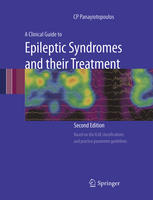

Most ebook files are in PDF format, so you can easily read them using various software such as Foxit Reader or directly on the Google Chrome browser.
Some ebook files are released by publishers in other formats such as .awz, .mobi, .epub, .fb2, etc. You may need to install specific software to read these formats on mobile/PC, such as Calibre.
Please read the tutorial at this link: https://ebookbell.com/faq
We offer FREE conversion to the popular formats you request; however, this may take some time. Therefore, right after payment, please email us, and we will try to provide the service as quickly as possible.
For some exceptional file formats or broken links (if any), please refrain from opening any disputes. Instead, email us first, and we will try to assist within a maximum of 6 hours.
EbookBell Team

4.7
66 reviewsThis revised edition is indispensable reading for all those who care for patients with epileptic seizures. Building on the sell-out success of the first edition this thorough revision reflects the latest report of the ILAE classification core group and the significant progress made in the diagnosis, classification and treatment of the epilepsies.
Praise for this edition
"A Clinical Guide to Epileptic Syndromes and Their Treatment is well worth having in your library for its compendious information and significant update since its first edition (2002)... The text has truly become a pragmatic and helpful guide in the treatment of epilepsy." (George L. Morris III; JAMA)
Praise for the first edition
"This book is of great importance as the first one to cover epilepsy according to the new ILAE classification. It provides the necessary precondition for successful treatment management as well as for meaningful communication in the clinical and scientific community. " (Roger Weis; EJPN)
"I recommend this book, the only one of its kind, to epileptologists, electrophysiologists, EEG technicians, neurologists, paediatricians, and even general physicians." (Nadir Bharucha; Lancet Neurology)
"There are few books that a busy clinician will want to read from cover to cover whilst preparing a review —this is one of them." (Roger Cull; Brain)
"Extremely well referenced… a useful source to the literature… attractively presented, with colours used to highlight aspects such as definitions and some controversial issues… well illustrated." (Sam Berkovic; Brain)
"This book is a delightful rarity." (John Duncan; J Neurol Neurosurg Psychiatry)
"I’ve read this book with interest, from end to end. It is fascinating, well- written and lively and makes the reader question his assumptions and procedures. Every person with an interest in epilepsy should read it." (Tim Betts; Seizure)